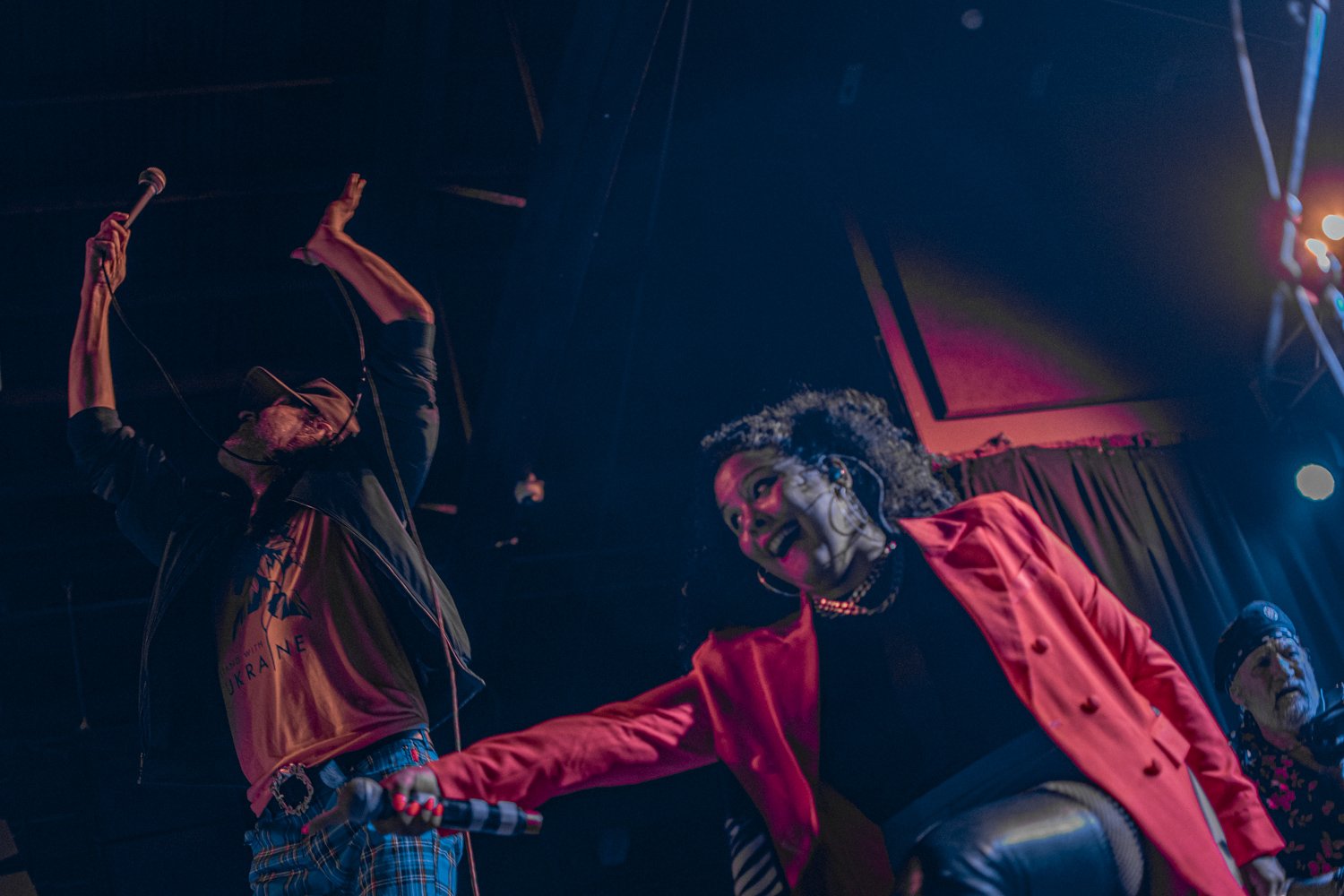Concert review: Gogol Bordello at The Orange Peel
It’s hard to say who the primary benefactor of energy is at a Gogol Bordello concert: the band itself or the throngs of fans who pack in to see the multinational collective deliver its distinct brand of punk rock.
The group’s May 10 gig at The Orange Peel created that almost stark divide well before the main act even hit the stage. Even as Asheville-based opener Sirius.B brought its sonic palette of Eastern European folk, and large swaths of people were milling about and finding a place among the packed house, the venue’s outskirts were riddled with concertgoers engaged in dance and donning costumes that helped to cement the sense of pride and culture in the building.
Top hats, festive masks, and tattooed skin were among the accessories on display. Elsewhere, a prominent Ukrainian flag rested on and over the pit barrier, and a banner depicting a fist with the same blue and yellow color scheme loomed over the stage, the word “Solidaritine” forming an arch over the symbol. As the house lights dimmed, the musicians who took to the stage reflected such solidarity.
Bassist Gill Alexandre hails from Brazil (and was raised in Queens), while violinist and keyboardist Sergey Ryabtsev and guitarist Boris Pelekh were born in Russia. There are even a couple Americans among the group in the form of vocalist and percussionist Ashley Tobias, aka “TOBI,” and San Diego’s own Korey Kingston on drums. Last but certainly not least is Ecuador’s own Pedro Erazo, the group’s resident percussionist/multi-instrumentalist/MC.
Arguably the main star of the show, however, is Ukrainian frontman and lead singer Eugene Hütz, who elicited the greatest amount of applause and cheers as he took center stage. His messy mane, distinctly styled mustache, and slinky frame were enough to signify why the man is a fan favorite. That Hütz’s boundless energy and pinpoint attunement to the show’s needs exceed these superficial qualities are testament to his prowess as a consummate performer. It’s also this power as an entertainer that allowed Gogol Bordello to put on a rousing show that was inspired and topical in equal measure.
The conflict in Ukraine obviously casts a shadow over not just the country’s own denizens, but anybody who has an iota of care for the world at large. During almost every song, Hütz and company rose onto illuminated boxes at the front of the stage, the sharp light emanating from the contraptions below their feet casting delightfully ghoulish shadows on their faces. The torrent of fans reaching out in ecstasy as the musicians took these positions and poses seemed to position the band members as figureheads, creating a form of solidarity between band and audience members alike.
The only time any political rhetoric was outright stated was in Hütz’s introduction of a brand new song, “Focus Coin.” “It’s about zombie farming,” he said.”Could be about North Korea…or Russia.” That last mention received its fair share of disdain from the crowd.
But the number that directly preceded it — the fan favorite “Alcohol” — was perhaps more indicative of the night’s overall attitude. As Hütz and TOBI casually downed champagne, rouge drops fired from the bottle and onto the people in the splash zone at any given moment of euphoria.
Soon, a whirlpool of a mosh pit formed near the front. I inched my own way closer to it (for research purposes, of course) and felt an intense fight-or-flight response. I stayed at the edge with the knowledge and slight fear that I could be sucked in at any moment. It was simultaneously one of the most exhilarating and terrifying stretches of time in my life, and this energy was not lost on Gogol Bordello. During the final moments of the show, a sweaty and shirtless Hütz rode a marching bass drum onto the hands of the crowd, draping himself in the Ukrainian flag that a fan had brought along. Looking up at this figure, with numerous hands reaching to get even a single touch, conjured a collective awe.
Hütz eventually returned to the stage, flag still draped around him, and introduced the band members. They made their customary exits before the cleanup and tech crews came out to do their business (including a venue staff member handing out water to winded patrons). Erazo, however, did stay behind to greet fans and indulge in brief conversation. The hype man who’d held his own on the mic while also rocking the bells, tambourine, cowbell, and congas had displayed a small Ukrainian flag at the forefront of his gear, and now passed that gracious attitude along in an extremely personable way.
These small moments, between the rowdy smashing of bodies and cathartic screaming singalongs, really do define the general concert-going experience above all else. If someone fell in the mosh pit that night, someone else was right there to pick that person up. Everyone had each other’s back. In that sense, everyone was offered a deeply secure form of solidarity, even if only for one night. The mind reels at the possibilities.
(Photos by Jonny Leather)






